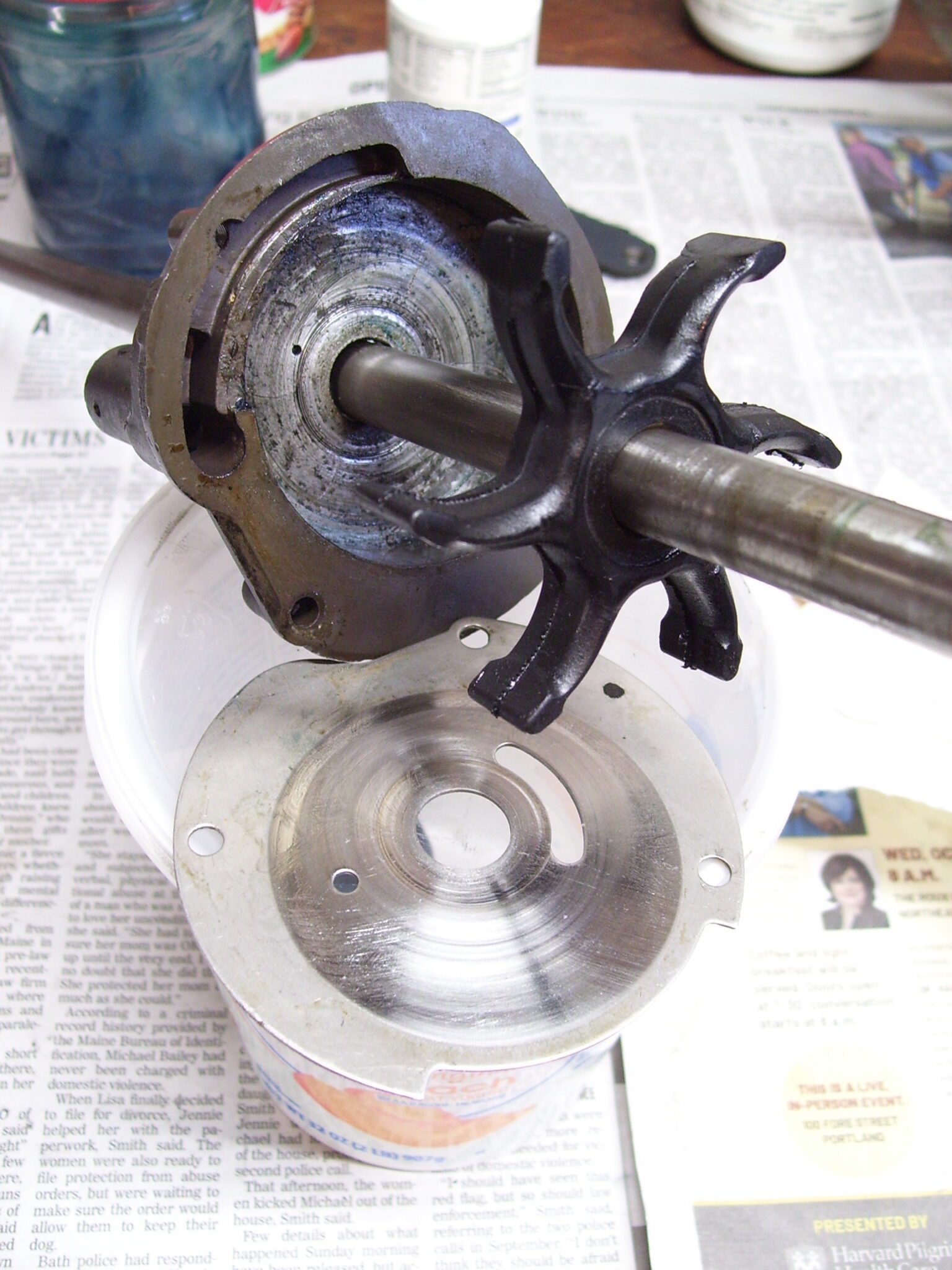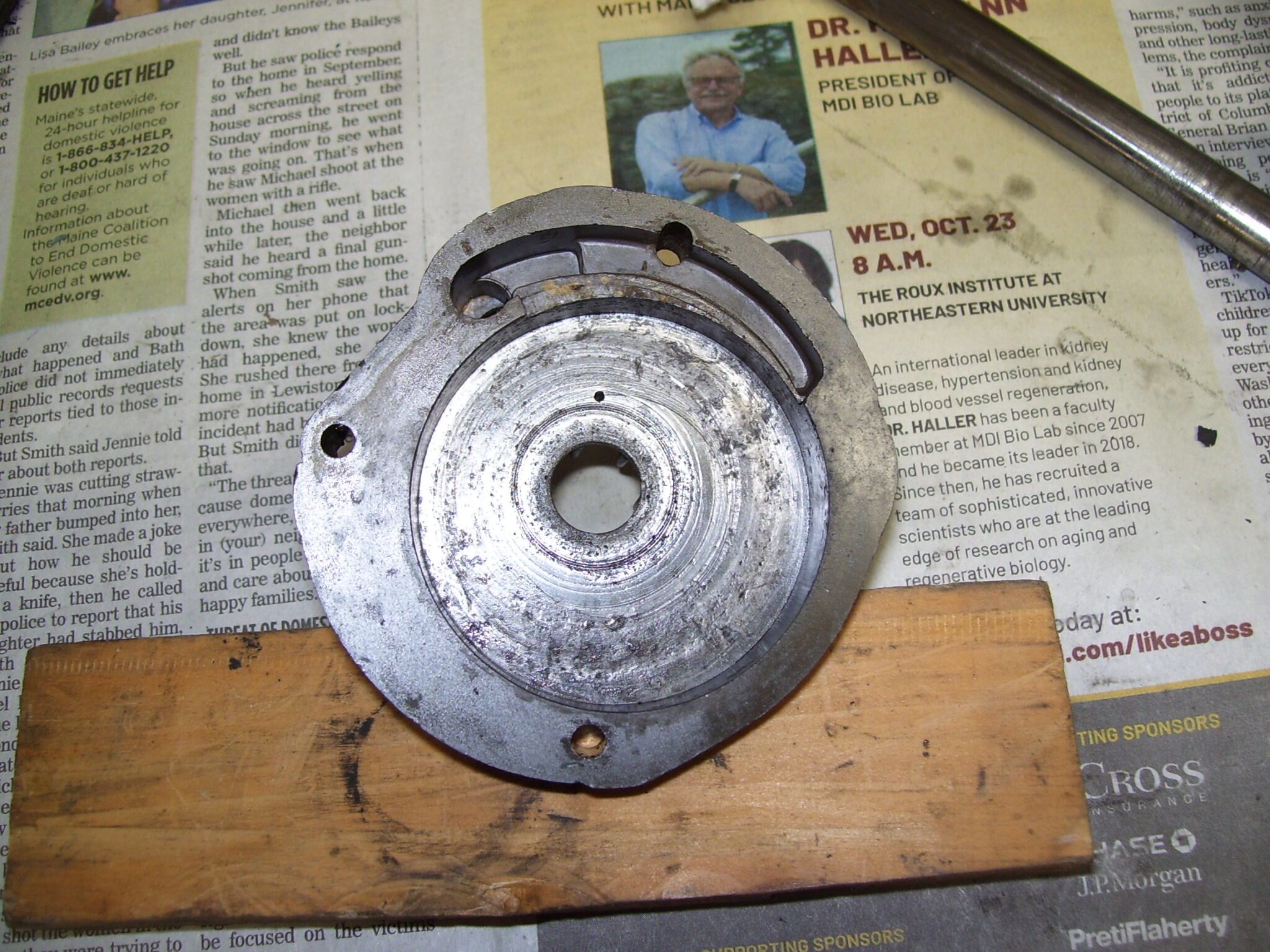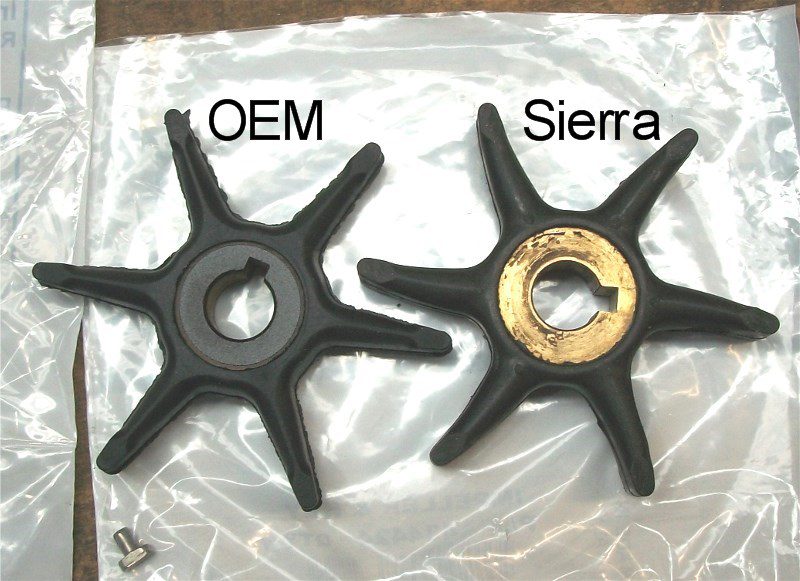Home › Forum › Ask A Member › Pump Impeller vanes “set” in a month
- This topic has 9 replies, 7 voices, and was last updated 3 months, 2 weeks ago by
 David Bartlett.
David Bartlett.
-
AuthorPosts
-
October 31, 2024 at 10:44 am #291849
Last March I replaced the impeller on a 1958 Evinrude 18 HP with a Sierra 18-3002 impeller ($23.50 USD). Ran the motor for one month from June 13 to July 12. Before I took the pump apart I noticed that effort to turn the driveshaft was high. The pump was clearly dragging. Took the pump apart yesterday and the vanes are set (curved permanently). Here is a photo.
Heard that replacing the impeller every 2 years is recommended. The vanes are still pliable although set.
Should I replace this impeller after one month of service? Would appreciate any comments from people with more experience.
October 31, 2024 at 4:34 pm #291861The impeller probably is OK. I’d consider that pump housing to be worn out though. Your choice.
1 user thanked author for this post.
October 31, 2024 at 6:58 pm #291869“Before I took the pump apart I noticed that effort to turn the driveshaft was high. The pump was clearly dragging.”
Possibly you got one of those fat impellers Sierra has.
1 user thanked author for this post.
October 31, 2024 at 7:28 pm #291871I think so too. I sanded it a bit and force to turn the driveshaft is much lower.
November 2, 2024 at 7:33 am #291890I had a 1954 Johnson CD-11 5.5 hp that had an almost new Sierra impeller, so when servicing the motor, I decided not to replace it. Sold the motor to an acquaintance.
The guy called me up and complained that it took him two hands to pull the motor over, so I offered to fix the problem. Just as others have stated, the Sierra pump was the problem. It was too tall and rubbing hard on the impeller plate as well as the housing.
When comparing the Sierra impeller to an OMC impeller, there was clearly more of a step-up from the brass hub to the rubber on the Sierra. I sanded the impeller on a lapping stone with 220 gr. until the rubber was nearly even with the brass hub on both top and bottom. Problem solved.
Most Sierra parts are just fine, but the impellers and points not so much.
1 user thanked author for this post.
November 2, 2024 at 10:02 am #291891I had a 1954 Johnson CD-11 5.5 hp that had an almost new Sierra impeller, so when servicing the motor, I decided not to replace it. Sold the motor to an acquaintance.
The guy called me up and complained that it took him two hands to pull the motor over, so I offered to fix the problem. Just as others have stated, the Sierra pump was the problem. It was too tall and rubbing hard on the impeller plate as well as the housing.
When comparing the Sierra impeller to an OMC impeller, there was clearly more of a step-up from the brass hub to the rubber on the Sierra. I sanded the impeller on a lapping stone with 220 gr. until the rubber was nearly even with the brass hub on both top and bottom. Problem solved.
Most Sierra parts are just fine, but the impellers and points not so much.
I had one of those CD Johnsons and it became to hard to pull. It turned out to be the shock absorber was broken. It was to long and it was pressing on the water pump housing.
My experience with impellers on OMC motors goes like this. I put the impeller in the housing. Move it to the side where it would be if installed on the leg. If the paddles don’t touch the housing I change it.
dale
1 user thanked author for this post.
November 2, 2024 at 6:54 pm #291894Same here with my cd11 shock absorber …. drove me crazy thinking the pump was binding…had it welded ..no more problems but…. no shock absorber on the 18hp from diagrams.
Joining AOMCI has priviledges 🙂
November 6, 2024 at 9:07 pm #291948Tried to clean up the worn grooved pump housing. Put it in a lathe and indicated the pump cavity to be straight and concentric. Measured the depth of the pump cavity to be 0.508 inch. Took several light cuts on the bottom of the cavity removing 0.006 inches. Then took 0.006 inches off the housing flange which brought the cavity depth back to 0.508 inch. This removed most all of the damage leaving one partial groove about 0.002 inch deep, which should be OK. Did not want to remove much material as it narrows the water discharge passage. The narrowest part of the passage is about 0.100 deep (not machined just as cast) so the passage would be 0.006 inch narrower. Also it is difficult to hold the housing in the lathe and the less machining the less chance of the housing moving during cutting. See photo I think this will work.
November 7, 2024 at 7:10 am #291956big improvement to say the least .. should work but I am not a pump expert I just wirebrush them.. never had a problem. apply a touch of grease when reassembling.
Joining AOMCI has priviledges 🙂
1 user thanked author for this post.
November 7, 2024 at 9:53 am #291958Charlie,
The pump looks much better after machining.
David Bartlett
Pine Tree Boating Club Chapter"I don't fully understand everything I know!"
1 user thanked author for this post.
-
AuthorPosts
- You must be logged in to reply to this topic.




